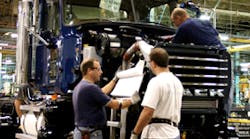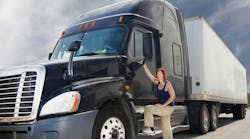FT. LAUDERDALE, FL. At a special truck engine panel session here hosted by leasing firm First Fleet Corp., engine manufacturers detailed some of the cost, operational, and maintenance needs fleets will experience with ‘07 engines and their emission-reduction technologies.
In particular, manufacturers focused on the different systems they are developing to clean out diesel particulate filters (DPFs)– a maintenance process the OEMs present believe is going to require less time and effort than many fleets think.
“The cleaning interval we’re targeting is 200,000 miles and we’re electing to pursue what we call a ‘liquid cleaning’ system as our prime path,” said Howard Lukens, gm--southern region for Detroit Diesel Corp. (DDC) “Flushing the filter with liquid rather than compressed air, we’ve found, is 95% effective in rinsing out all the ash.”
By contrast, Lukens said the current “bake and blow” system DDC also developed, whereby filters are heated to loosen ash deposits before being cleaned with compressed air, is only 50% to 70% as efficient in removing ash buildup.
“I’m not saying cleaning with compressed air is not a workable solution for cleaning filters,” Lukens said. “It’s just that from our experience, liquid cleaning is more effective in getting more useful life out of it.”
However, the initial cost for the liquid cleaning system is currently extremely expensive, Lukens added. DDC is exploring whether to help subsidize dealer efforts to purchase the required equipment or set up a central “cleaning service” within the company.
Jeff Boyd, truck engine district sales manager for Caterpillar, noted that his company is sticking with the dry cleaning solution for filters. He said the Caterpillar Regeneration System (CRS) coupled with increased combustion injection pressures and the series turbocharging in its ACERT engines should substantially lower the formation of ash in the first place.
“Since our 2007 solution relies more on in-cylinder reduction to reduce ash rather than the DPF, we believe we can increase the service interval of the filter to 300,000 miles and clean it with compressed air,” Boyd said. “CRS provides a much more complete burn so it’s a lot easier to clean the filter.”
Carrie-Ann Baker, director of key accounts for Volvo Powertrain, stressed that fleet managers need to understand that difference between “particulates” and “ash” when discussing DPF cleaning processes. “Regeneration of the filter by either passive or active means eliminating the particulates – the ‘ash’ comes from the unburned detergents from the engine oil. It’s important for fleets to realize that the ash does not come from particulate matter or soot.”
In terms of the overall cost impact of 2007, DDC’s Lukens said his company’s research indicates that engines with ’07 emission-reduction technology are going to increase the average Class 8 vehicle’s price by $6,638, along with additional yearly maintenance costs of $367.
“Tax incentives to help fleets defray the cost of 2007 technology didn’t make it into the national energy bill passed last year and although they are still being pursued, we think it’s unlikely we’ll get them,” Lukens said.
On the bright side, fuel losses may not be as bad as expected in 2007, the engine makers noted. “We’ve been expecting fuel efficiency losses from the back pressure created by the DPF and the lower energy content of ultra low sulfur diesel (ULSD) fuel,” said Volvo’s Baker, ULSD was said to have anywhere from 1% to 4% less energy, according to the estimates given out by the OEMs.
“So we built our 2007 with those losses in mind, looking for ways to balance them out,” Baker noted. “Due to those efforts, we believe our engines should post the same fuel consumption levels as our current [2002- and 2004-compliant] products.”
DDC’s Lukens said his company’s 2007 truck engines should only see a 1% decline in fuel economy.
Eric Arnold, district manager for Caterpillar, said its 2007 heavy-duty engines should remain “fuel economy neutral” and register no losses, while its medium-duty engine family should actually see a 2% to 4% improvement in fuel economy.
There are two big uncertainties about 2007 engines and aftertreatment systems. One, according to Caterpillar’s Boyd, is how various engine components– fan belts, hoses, and other parts– may be affected by the higher heat loads produced by 2007 engines. Heat loads are expected to be from 10% and 30% higher than today’s models. “There’s just so much more heat under the hood that we’re not sure how that could impact component life,” he said.
Secondly, there is the potential for theft of DPFs – devices estimated to cost at least $3,000. “We really haven’t thought about theft deterrence,” said Lukens. “Frankly, it’s something we haven’t considered.”




